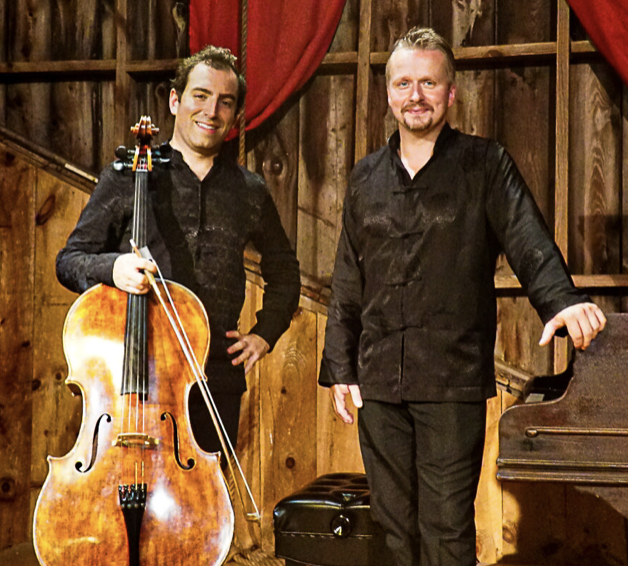|
Symphony
SRS SEASON ENDS WITH RESOUNDING TA-TA-TA-BANG
by Terry McNeill
Sunday, June 1, 2025
Symphony
YOUTHFUL VIRTUOSITY ON DISPLAY AT USO'S MAY CONCERTS
by Peter Lert
Saturday, May 17, 2025
Symphony
MYSTICAL PLANETS AND LIVELY GERSHWIN ORTIZ AT FINAL SRS CONCERT
by Peter Lert
Sunday, May 4, 2025
Symphony
VSO'S CONCERT MUSIC OF TIME, MUSIC OF PLACE
by Peter Lert
Sunday, April 27, 2025
Choral and Vocal
VOCAL ELEGANCE AND FIRE AT THE 222'S RECITAL APRIL 26
by Pamela Hicks Gailey
Saturday, April 26, 2025
CANTIAMO SONOMA SINGS AN INSPIRED GOOD FRIDAY MOZART REQUIEM CONCERT
by Pamela Hicks Gailey
Friday, April 18, 2025
DRAMATIC SHOSTAKOVICH SYMPHONY CLOSES PHILHARMONIC'S 25TH SEASON
by Terry McNeill
Sunday, April 13, 2025
LARGE COLLEGE OF MARIN AUDIENCE GREETS STOPHER ARTISTRY
by Terry McNeill
Saturday, April 5, 2025
Chamber
FRISSON DELIVERS SHIVERS OF DELIGHT
by Abby Wasserman
Sunday, March 30, 2025
OLD AND MOSTLY NEW IN SRS MARCH CONCERT IN WEILL
by Peter Lert
Saturday, March 22, 2025
|
 |
 Thomas Mesa and Ilya Yakushev |
DRAMATIC CELLO LYRICISM IN RECITAL AT THE 222
by Terry McNeill
Friday, September 23, 2022
For classical music events at the newly-minted 222 Gallery off the Healdsburg Plaza are different. There is cabaret seating, artist rep Gary McLaughlin conducts extended pre-concert performer interviews from the stage, and before each programmed piece the performers frequently add to the verbiage ad infinitum. Well, it’s that kind of format at the 222, and for an audience of 125 Sept. 23 it was a rousing and successful concert.
Cellist Thomas Mesa and pianist Ilya Yakushev played a recital where the bookends were Beethoven and Rachmaninoff sonatas, and three short crowd-pleasing works that ended the first half. First was Andrea Casarrubios’ Silbo (2021), played atmospherically with Mr. Mesa’s convincing bottom register sound often rhapsodic and laconic. Piazzolla’s popular Oblivión followed, a lovely five-minute nostalgic journey that has been transcribed for dozens of instrumental combinations. Here it was played energetically and with consummate control.
The Galop from Claude Bolling’s Suite for Cello and Jazz Piano Trio closed the first half in an eclectic reading that saw Mr. Mesa’s slashing bow and ostinato sound from Mr. Yakushev’s piano excite the audience. Here the pulsating rhythms and strangely movie music character of the galop joined to make a thrilling impact. An encore piece well before the concert’s end. Both men were enamored of extravagant facial expressions throughout.
Beethoven’s middle-period A Major Sonata, Op. 69, was given a rich bass register performance, the opening Allegro a bit more timid than usual, the cello’s treble sound limited. But things developed, with big sforzandos and aggressive playing from both performers. In the Scherzo the requisite momentum was maintained, though with the piano line sporadically covering the cello’s sound and the room’s piano needing more tonal color.
In the wonderful cantabile finale the tempo selected was just right, avoiding the danger of a faster pace that can generate synergetic problems. I have heard in this work from 1808 the music going off the tracks due to speed, but it didn’t happen here. Modulations were emphasized throughout this movement, with a big carefully measured diminuendo just before the final five chords.
The duo finished the recital with an elegiac interpretation of the Rachmaninoff’s G Minor Sonata, Op. 19, and the often somber lyricism of the work suited both performers. The hall’s lack of reverberation never seemed to be a barrier to clear and direct sound, even in dense passages. Mr. Yakushev’s initial long solo was adroitly shaped, and Mr. Mesa’s thematic projection in the Allegro Scherzando was palpable. The constant alternating lyrical-dramatic phrases gave each artist rich material for virtuoso performing.
The famous Andante movement, so beloved by cellists, received a warm reading from Mr. Mesa’s soulful cello, albeit with ample damper pedal from Mr. Yakushev’s piano part. It was a tonally rich collaboration. The playing in the finale tended to wander a bit, but of course all who wander are not lost, and the composer provided thick musical textures that the duo wonderfully exploited. It was playing that effectively captured the aching romanticism of the 1901 work.
The applause elicited an encore, and certainly no surprise was St. Saëns “Swan” from his Carnaval of the Animals. Luxurious lyricism flowed again.
|

